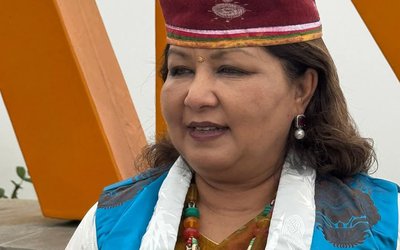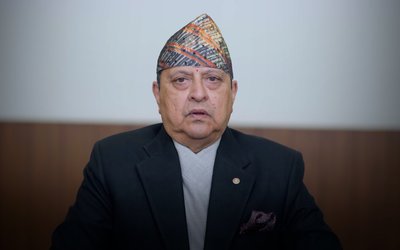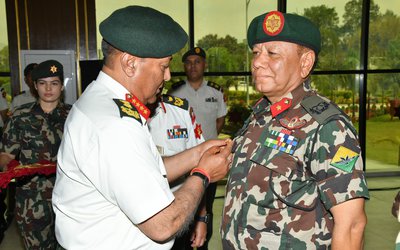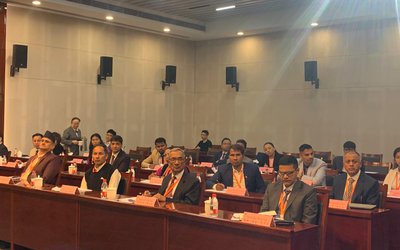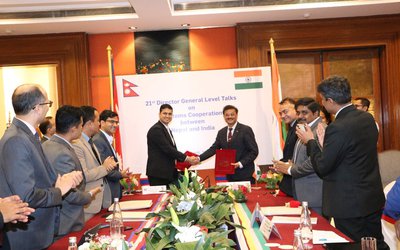
Since his arrival in Nepal, Israel Ambassador Hanan Goder has embarked on a single mission and vision: to show that Nepal has the geographical diversity to produce a variety of agriculture products to economically transform the Nepali society.
Although the government of Israel has been supporting Nepal's small farmers for quite a long time through Agriculture Development Bank and now Small Farmers Development Bank, Hanan Goder has now implemented a new idea. The idea is to send 200 students from the families of small farmers to Israel for advanced agriculture training, which will have far reaching implications in Nepalese agriculture sector.
"This is a scheme of ambassador Hanan. We need to thank him for his efforts to give exposure to Nepalese youth in modern agriculture," said Rabindra Kumar Shakya, vice chairman of National Planning Commission, and president of Shalom Club-Nepal.
With the technical support from Israel government, farmers in Kathmandu started to grow high breed tomato. Similarly, the farmers in Mahadev Beshi in Dhading learnt the way to grow high breed products to increase their production.
With the population overwhelmingly dominated by small farmers, Nepal's economic prosperity is possible only through the transformation in the agriculture sector. In that context, the effort to send 200 youths in Israel will have a long lasting impact in Nepal.
Although various training programs are organized for the farmers, this is for the first time youths will be taken to Israel. Among many youths, Arjun Aryal is one of them who are going to Israel. The 200 youths, including Aryal, from Dhading, Makwanpur and other districts, are going on a fully sponsored trip to Israel for agricultural training.
Fifty-five youths from Dhading and Makwanpur will go to Israel by mid-August in the first phase while other 145 youths including those from Chitwan, Nawalparasi, Jhapa, Ilam, Morang and Sunsari districts will reach Israel by mid-September.
“This program will be successful in raising involvement of youths in agriculture in Nepal,” states SFDB Chief executive officer Jalan Kumar Sharma. “We are sending 200 youths for trial and the number will be raised to 1,000 if the program succeeds,” he adds.
The Nepali youths will be trained at the Arava International Center for Agricultural Training in Negev, Israel, according to the Israeli Embassy. They will be given theoretical classes for a day and will be involved in investigative practical classes for five days in a week. They will even get remunerations as per the Israeli standards for being involved in practical classes.
The hi-tech agriculture farming training program has received the cooperation from the Israeli embassy in Nepal and Small Farmers Development Bank. "The first batch of 55 youths will leave for Israel in the middle of August," said chief executive officer of the bank Jalan Kumar Sharma.
The students are being selected through lottery and interviews from among the family members of Small Farmers Agriculture Cooperatives associated with the Small Farmers Development Bank.
The youths selected from small farmers’ families of Makawanpur and Dhading districts will get on-the-job training there. “The selected youths are dedicated to start hi-tech farming practices in their villages and change the traditional way of doing agriculture,” said Sharma, adding there are hundreds of youths that have been using Israeli technique in agriculture.
"Hi-tech agriculture training given to Nepali youth will change traditional agriculture system in Nepal. Two-thirds population of the country has been adopting substantive agriculture. It is the real case of poverty," said Hanan Goder, adding training at Arava International Centre for Agriculture Training (AICAT) will turn them toward commercial agriculture.
After returning from the training, the students are expected to share their knowledge, apply modern technology and learned skills from Israel with the fellow farmers in Nepal. "These students are also expected to engage in agriculture projects with support from the Small Farmers Development Bank in order to bring changes in the quality of life of small marginalized farmers.
At a time when large numbers Nepalese youths are heading for Gulf countries for labor work, Israeli Embassy's efforts to train Nepalese in agriculture and send back to Nepal may help to reverse the situation.
- NEPAL-THAILAND: Joint Business Council
- Apr 13, 2025
- BIMSTEC SUMMIT: Nepal’s Stand
- Apr 11, 2025
- IME GROUP: Expands Into Paper Industry
- Mar 24, 2025
- CPN UML: Instigated By India
- Mar 23, 2025
- ADB’S CHIEF ECONOMIST: Nepal Reduces Poverty
- Mar 11, 2025
